(单词翻译:单击)
Japan has a unique culture with a very strict code of etiquette.
日本有着独特的文化和严格的礼仪。
]There are specific ways to eat noodles, good practices for accepting gifts, and certain rules to follow to avoid insulting a host.
吃面条也有着特殊的方法,收礼物也要有好的方式,更别说要遵守一些规则避免侮辱招待你的人了。
This complex web of social rules and traditions can be overwhelming for those traveling to Japan, so we compiled a list of some of the things foreigners find most shocking when visiting the country.
这个复杂的社会规则和传统网可能会让一些刚来日本的人觉得倍受打击,所以我们制作了一个的表单囊括了那些会让外国人震惊的规则。
Here are 11 customs you should know before traveling to Japan.
这里是你去日本旅行之前需要知道的11项习俗。
1. No. 4 is avoided at all cost.
尽量避免数字4。
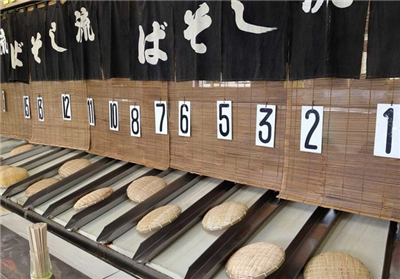
In Japan, the number "four" is avoided because it sounds very similar to the word for death. In the same vein as No. 13 in Western culture, No. 4 is extremely unlucky and is used as little as possible. You must always avoid giving anyone something in fours because it can be seen as a very ominous gift.
在日本,数字"4"因为听起来像"死"字所以被尽量避免。就像西方文化避免数字"13"一样,"4"代表着极端的不幸。你必须避免给别人"4"样的东西,因为它是不详的礼物,
Elevator labels will often be missing a fourth floor — and in extreme cases, they will not have floors 40 to 49. No. 49 is especially unlucky, as it sounds similar to the phrase that means "pain until death."
电梯标签经常会刻意忽略第4层,在极端的情况下,楼内不会有40到49的楼层。而49被认为是特别不幸运的,因为它听起来像"痛苦至死"。
The practice of avoiding No. 4 is called "Tetraphobia," and it is common in many East Asian and Southeast Asian regions.
避免"4"的习俗被称为"四的禁忌",这在很多东亚和东南亚地区十分常见。
2. Blowing your nose in public is considered rude.
在公共场所擤鼻子是十分粗鲁的行为。
Blowing your nose in public is seen as not only rude, but simply disgusting. Instead people will general ly sniffle until they find somewhere private. If you simply must blow your nose, it is recommended that y ou do so as discreetly as possible.
在公共场所擤鼻子不但会被认为十分粗鲁,还会让人觉得十分恶心。通常人们会吸着鼻涕直到找到一个私密的地方。如果你必须要擤鼻子,建议你做得越小心越好。
The Japanese are also repelled by the idea of a handkerchief.
曰本人也很抗拒手帕这种东西。
3. Tipping can be seen as insulting.
给小费会被认为是侮辱。
Tipping is considered rude 8imdash; and can even be seen as degrading. Tipping will often cause confusion ,and many people will chase after you to give you back your money.
给小费是很粗昔的,也会被认为是故意侮辱人。给小费通常会令人感到糊涂,而很多人会追着你把钱还给你。
If someone has been particularly helpful and you feel absolutely compelled to leave a tip. Rough Guides suggests leaving a small present instead
如果你真的对某些帮了你大忙的人特别感激而一定要给他小费,我们建议你留下一份小礼物吧。
4. Walking and eating is seen as sloppy.
边走边吃会被认为很邋遢
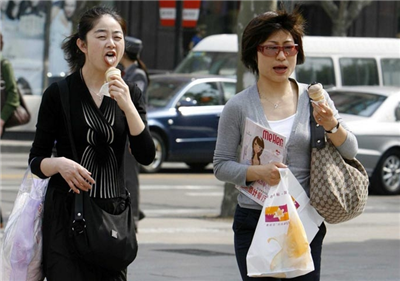
Although walking and eating is often convenient and widely accepted in many Western cultures, the practice is looked down upon in Japan. Many also consider it rude to eat in public or on the trains.
虽然边走边吃在很多西方国家都是方便且可以接受的行为,日本人却瞧不起这些行为。很多人认为这同样是粗鲁的表现,特别是在公共场合或者火车里吃东西的时候。
There are just a few exceptions to this rule, including the fact that it is OK to eat an ice-cream cone on the street.
但这个规则也有几个例外,包括在街上吃冰淇淋甜筒是没问题的。
5. There are designated people who will push you into a crowded subway car.
有特定的人会把你推进拥挤的地铁里。
Oshiya, or "pushers," wear uniforms, white gloves, and hats and literally push people into crowded subway cars during rush hour.
Oshiya或者是“助推员”,他们穿着制服,白手套还有帽子,如字面的意思会在繁忙时段把人推进拥挤的地铁里。
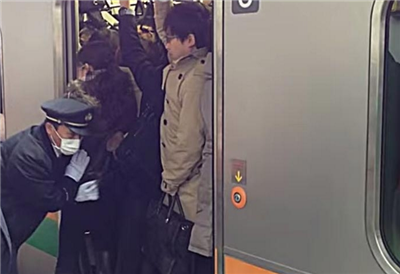
They are paid to make sure everybody gets in and doesn't get caught in the doors.
他们被请来确保所有人都能上车而不被车门夹到。
6. People will sleep on the trains with their head on your shoulder.
其他人会把头靠着你的肩膀睡觉。
If someone in Japan falls asleep with his or her head on you shoulder, it is common practice to just tolerate it. People have very long commutes and work dreadfully long hours, so many will often fall asleep on the train.
在日本如果有人把头靠着你的肩膀睡觉,这是很常见的事情,而你最好学会忍受它。日本人从工作地点回家要很长的时间,而他们已经很累了,在火车上经常有人睡着。
"There is a tolerance that if the person next to you falls asleep and their head kind of lands on your shoulder, people just put up with it," Sandra Barron told CNN. "That happens a lot."
“如果有人在你旁边睡着而且把头靠在你的肩膀上,大家通常都会忍受这种为。”Sandra Barron告诉CNN。“这经常发生。”
7. There are toilet slippers for the bathrooms.
有厕所专用的拖鞋。
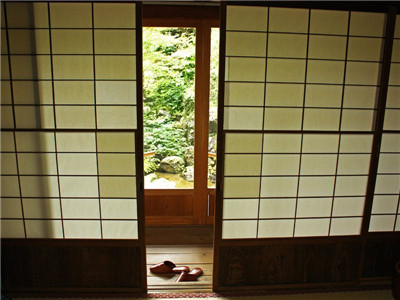
It is customary to change into slippers when entering a Japanese home, a traditional restaurant, temples, and sometimes museums and art galleries, according to Rough Guides. Basically any time you come across of row of slippers in Japan, you should just put them on.
进日本屋子、传统餐厅、庙宇和一些博物馆艺术馆之前换拖鞋是惯例。基本上你只要看见拖鞋,穿上它就对了。
There are even special toilet slippers kept inside the bathroom, so you'll take off your house slippers and put on the toilet slippers.
甚至于厕所也有专用的拖鞋,所以你需要脱下家居拖鞋换上厕所拖鞋。
8. You must always bring a host a gift.
你需要经常预备礼物给招待你的人。
It is an honor in Japan to be invited to someone's home, and if this happens, you must always bring a gift. The gift should also be wrapped in the most elaborate way possible, and lots of fancy ribbons are suggested.
在日本被请进别人家里是个荣耀,如果这真的发生了,你需要带个礼物。礼物应该被精心包裹,最好再加上饰带。
You should also never refuse a gift once offered — but it is good practice to strongly protest the gift at first.
你也不应该拒绝一份礼物,但在收下之前推辞一番也是必要的。
9. Pouring you own glass is considered rude.
给自己的杯子倒酒被认为是粗鲁的。
It is customary in the US (and many other countries in the world) to serve others before you serve yourself, but in Japan you are never supposed to pour yourself a drink. If you have poured for others, another guest will hopefully see that your drink is empty and pour for you.
在美国和很多国家你应该先给别人倒酒再给自己倒酒,但在日本你不应该给自己倒酒。如果你给别人倒了,其他人会希望你的杯子是空的,以便他们给你倒酒。
You must also always wait for someone to say "Kanpai" (cheers) before drinking.
你也必须要等到别人说“Kanpai”(干杯)后才能喝酒。
10. Slurping noodles is not only seen as polite — but it also means you have enjoyed your meal.
吸溜面条时发出声音是礼貌的,而且还表示你很享受你的食物。
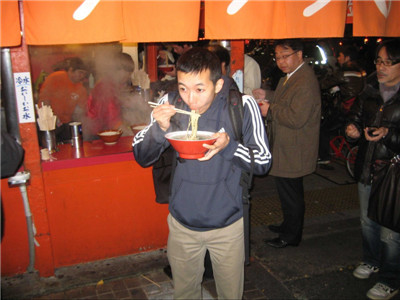
Slurping is considered polite in Japan because it shows that you are enjoying your delicious noodles — in fact, if you don't eat loudly enough, it can be mistaken as you not enjoying your food.
吸溜面条时发出声音是礼貌的,因为这代表你享受这碗美味的面条——事实上,如果你不大声的吃,你会让人误会你并不享受你的食物。
Slurping noodles is not entirely for the sake of politeness, but also to avoid having a burnt tongue. Japanese soup and noodles are generally served steaming hot — hot enough to burn — and slurping helps to cool down the food.
吸溜面条不但是为礼貌,而且还为了避免烫伤舌头。日本的汤面在端上来的时候是非常热的——热得足以烫伤你——而吸溜面条有助于冷却食物。
But unlike in some other Asian nations, it is still considered rude to belch at the table.
但不像其他亚洲国家,在饭桌上打嗝还是很粗鲁的。
11. Sleeping in capsule hotels in rooms barely bigger than a coffin is very common.
在仅比棺材大一点点的胶囊旅店睡觉是很常见的。
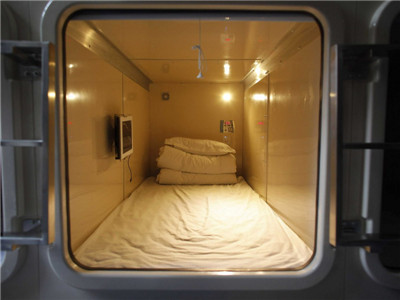
Capsule hotels are used as cheap accommodations for guests who purely want a place to sleep. They are used most often by businessmen working or by those who have partied too late and have missed the last train home.
胶囊旅店为那些只想随便找地方睡一晚的客人提供便宜的住宿。通常那些生意人和开派对太晚错过火车的人会住在这种地方。
The sleeping quarters are small capsules that are not much bigger than a coffin, and the beds are stacked side by side and on top of one another. The concept has been around in Japan since the 1970s, but it has begun to spread to a few other countries around the world.
睡觉的地方就像一个胶囊,只比棺材大一点点,而这些胶囊上下左右的挤在一起。这个概念在1970年代的日本已经有了,但最近已经开始传播到世界上的某些国家了。
The setup is a cheap alternative to a hotel, as a bed costs only $65 a night, but it should be avoided for anyone who suffers from even slight claustrophobia.
这是旅店的一种便宜替代品,一张床只要$65一晚,但任何有有闭恐惧症的人都应该避免住在这里。


